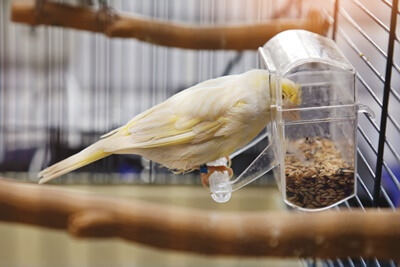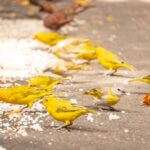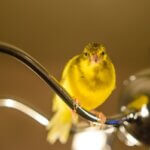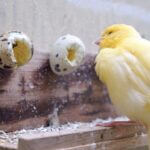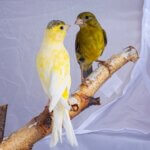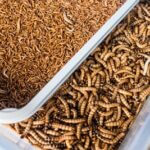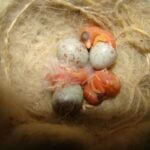Canaries have unique dietary needs, which must be satisfied to keep them strong and healthy.
Although canaries can survive on a staple of grains, an unbalanced diet can become monotonous. It’s vital to diversify a canary’s diet with nutritious foods that it enjoys.
In addition to providing a canary with a healthy diet, they must drink water throughout the day.
Best Foods For Canaries
While seed often makes up the bulk of a canary’s diet, it’s vital to supplement it with other foods. This will ensure they receive the nutrients needed for healthy growth and development.
Let’s explore the best foods to include in a canary’s diet:
Whole Seeds
Wild canaries eat various seeds, depending on what plants are in season. Seeds and grains should comprise the bulk of a canary diet.
Commercial seed mixes for canaries contain 3 to 5 different varieties.
The only downside of offering canaries an exclusive seed diet is that it only provides them with carbohydrates and fats while depriving them of other essential nutrients.
Most commercial seed mixes for canaries contain:
- White millet.
- Rapeseed.
- Flaxseed.
- Hulled oats.
- Perilla.
Canaries love millet seeds and selectively eat them in seed mixes. This can cause nutritional imbalances and predispose a canary to poor health.
Supplement seed mixes with fresh foods to ensure the canary receives all the nutrients it needs.
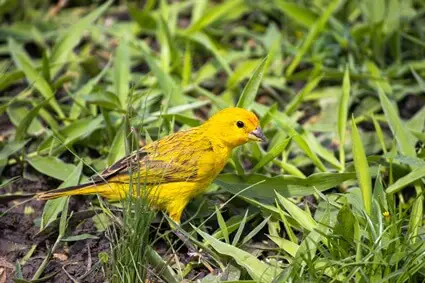
Fruits
Wild canaries consume fruits wherever they can find them.
So, if you keep canaries at home, include some fruits in their diet to ensure they receive essential vitamins and minerals. Fruits should comprise at least 20% of a canary’s daily diet.
Fruits that canaries enjoy eating include:
- Apples.
- Apricots.
- Melon.
- Grapes.
- Raspberries.
- Bananas.
- Papayas.
- Plums.
- Peaches.
- Tomatoes.
- Oranges.
- Pineapple.
While most canaries don’t mind eating whole fruits, some prefer to have them offered in bite sizes to make it easier for them to eat. You can place the chopped fruits in a bowl or hanging basket next to your pet’s cage to make it easier for it to access them.
Fresh Greens and Vegetables
Leafy greens and vegetables are rich in vitamins and minerals, which canaries require to develop robust immune systems. Consequently, these foods should comprise at least 20-25% of your canary’s daily diet.
Don’t over-feed your canary vegetables, which can cause the stool to become too loose and watery.
Vegetables to include in a canary’s regular diet include:
- Collard greens.
- Broccoli leaves.
- Cauliflower.
- Bok choy.
- Watercress.
- Spinach.
- Kale.
- Chickweed.
Avoid feeding your canary celery, lettuce, and other greens that mainly comprise water. These vegetables offer little nutritional value.
Eggs
Eggs are a source of protein for canaries. Feeding eggs to your canary improves brain development and immune function and helps with feather, beak, and bone health.
According to the International Journal of Avian Science, eggs provide high amounts of calcium. This is necessary for healthy egg formation in breeding female canaries.
Despite these benefits, eggs should only be offered to canaries in moderation as the high protein and cholesterol can cause obesity and overgrown beaks and nails.
Overindulging in eggs can also predispose your canary to more severe health problems, including fatty liver disease and cardiovascular illnesses.
So, limit the number of times you offer eggs to your canary. As a rule, you should feed your canary eggs no more than twice a week.
There are different ways to offer eggs to a canary, but hard-boiled eggs are the most common.
Mix egg food with ingredients like couscous, rice or quinoa seed, and vegetables.
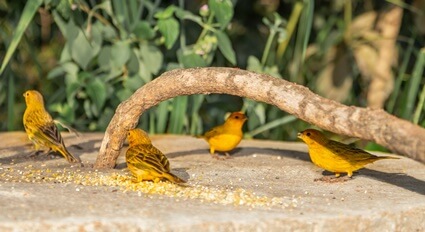
Grit Mix
Grit is needed in a canary’s diet because it helps with digestion.
Canaries eat seeds whole without removing the husks. Since their gizzards aren’t well suited to grinding down food, they need grit to provide the extra friction to help them digest the husks.
Moreover, grit helps promote calcium uptake, which is essential for healthy egg formation.
Grit should only be offered in moderation since overconsumption can lead to gastrointestinal obstruction. Offer no more than half a teaspoon of insoluble grit every year because insoluble grit can remain in a canary’s digestive system for up to a year.
If you’re using soluble grit, you can offer it to your pet at least once a month. According to the Journal of Avian Medicine and Surgery, soluble grit has less impact on gizzard function than insoluble grit. So, it’s considered more of a dietary supplement than a digestive aid.
Although both types of grit benefit canaries, whether your bird needs them depends on its diet and digestive health. If your canary subsists on a heavy seed and vegetable diet, it’ll require grit to help it digest the grain husks and vegetable skins.
If your canary has digestive issues, such as pancreatic disease, your vet may recommend adding some grit to its diet to compensate for the lack of digestive enzymes.
Cuttlebone
Cuttlebone contains essential minerals and calcium, which promote bone growth.
Also, biting and playing with a cuttlebone helps polish a canary’s beak and eliminate scaly layers that accumulate over time.
Cuttlebones provide a fun and active activity for birds. So, they’re considered a vital enrichment tool to keep inside a bird’s cage.
Cuttlebone usually comes with clips that you can use to secure it to the sides of the cage. You can also use a string to fasten the cuttlebone to the cage’s bars.
What Foods Do Canaries Like?
Wild canaries subsist on a seed-based diet, so the bulk of your pet canary’s diet should mainly comprise grains and seeds, such as:
- Flax seeds.
- Rapeseeds.
- Oats.
- White millet.
However, feeding your canary an exclusive seed diet won’t deliver enough nutrients to develop healthily. For this reason, it is recommended to include fresh fruits and vegetables.

